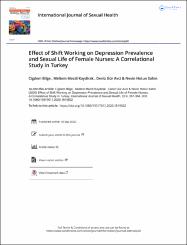Effect of Shift Working on Depression Prevalence and Sexual Life of Female Nurses: A Correlational Study in Turkey
Abstract
Objectives This study aimed to determine the effect of nurses' way of working on depression indications and their sexual lives (N = 163).Methods:The study had a correlational design. The present study was conducted with the participation of 163 women nurses who met the criteria for participation in the research in Turkey. The questionnaire included three psychometrically tested scales: the Female Sexual Function Index (FSFI), the Beck Depression Inventory (BDI), and the Visual Analog Scale (VAS), as well as the participant information form.Results:The study found that the total mean score of BDI of nurses who worked in shifts was higher than that of those who worked only in daytime (p < .001). The study also found that the total mean score of FSFI and its subscales other than desire (p > .05) were significantly lower than that of those who worked only in daytime.Conclusion:Nurses who worked night shifts had higher rates of depression (based on the BDI) and higher rates of sexual dysfunction.


















